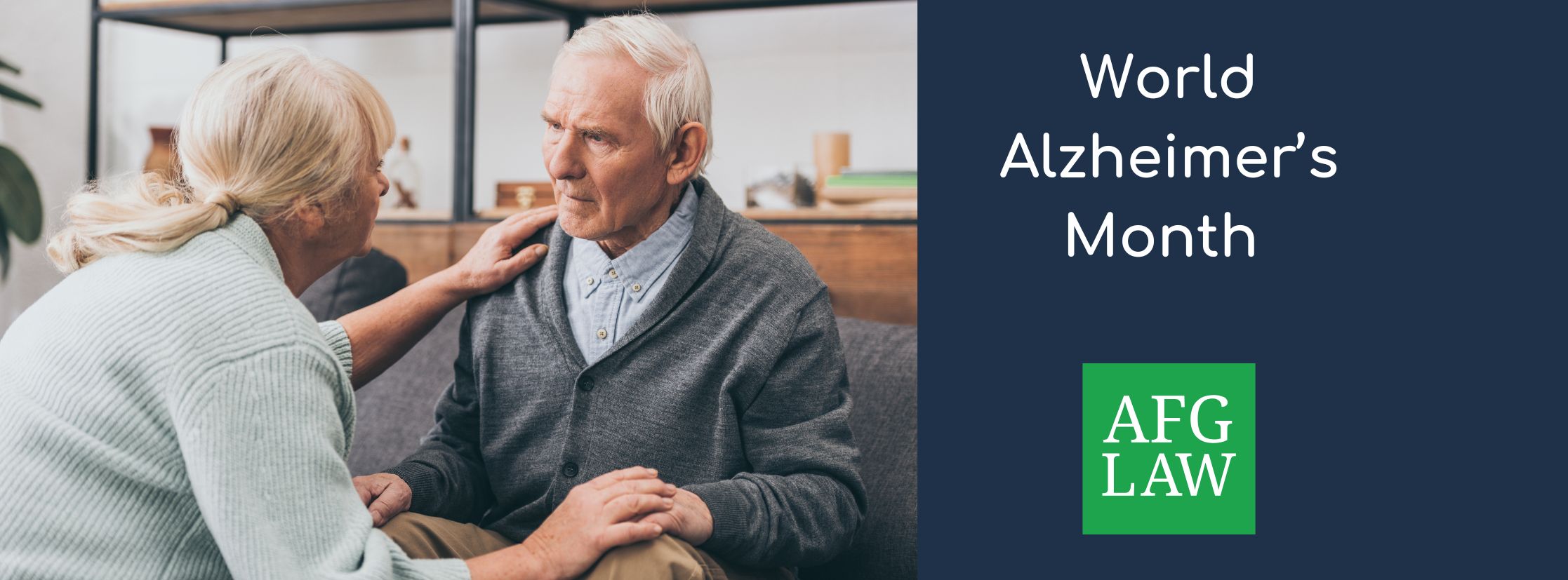World Alzheimer’s Month takes place every September and World Alzheimer’s Day is on 21 September each year. It’s a global opportunity to raise dementia awareness, challenge the stigma around dementia and support people affected by the disease.
Alzheimer’s disease is one of the most common forms of Dementia. According to the Alzheimer’s society, Dementia is the UK’s biggest killer affecting one in three people. Dementia is the name used for a group of symptoms which are associated with ongoing decline of brain functioning, affecting things like memory and thinking skills. Alzheimer’s is a progressive condition. This means that whilst the symptoms experienced may start minor, they will gradually develop over the years.
Forward Planning with Alzheimer’s
When thinking about lifetime planning, it is usual for most people to immediately think of making a Will. Whilst a Will protects assets after death, it is just as important to consider how your assets can be looked after during your lifetime.
Here we discuss Lasting Powers of Attorney and why they make life easier for those suffering from dementia and their loved ones. As dementia is progressive, over time it becomes more and more difficult to make decisions, whether that’s about your home, your health or any other important things in your life. Having a Lasting Power of Attorney is then a reassurance that someone you trust will be the one making decisions for you in future, in the case that you cannot make them yourself. This ensures that decisions being made are in your best interest. It is important to note that even if you are married or in a civil partnership, you should still make an LPA, as your partner is not automatically entitled to make decisions on your behalf.
There are two types of Lasting Powers of Attorney (LPAs)
- Property & Financial LPA. This covers the management of your finances. This could be accessing bank accounts in order to pay bills for example or allowing your property to be sold.
- Health & Welfare LPA. This covers decisions regarding health, treatment and where the person will live.
What would happen if you don’t make an LPA
In the event that a person loses mental capacity and has not made an LPA (or the old-style Enduring Power of Attorney) then a deputyship order will need to be made to appoint someone to make decisions for the person concerned. This involves an application being made to the Court of Protection. Applications can take anywhere between 6 months and 2 years. This is an expensive process, not only on the initial order, but through the lifetime of the person. We therefore recommend getting an LPA to avoid the expensive, complex, and time-consuming process of deputyship.
What if you have already been diagnosed with dementia?
Being told you have dementia can be an incredibly worrying time and many people will go straight to thinking about what preparations need to be made for the future. Being diagnosed does not prohibit you from getting an LPA put in place and, in the vast majority of cases, a person with dementia is able to get one.
Important to note
It may be that a person has made an Enduring Power of Attorney (EPA) prior to 1 October 2007. This is similar to the Property & Financial LPA, but it can only be registered when that person loses capacity or starts to lose capacity. EPAs were replaced by LPAs in 2007.
It is also worth noting that an EPA can only deal with finances. If you wish to appoint an Attorney to deal with your heath and welfare, you will need to complete a Health & Welfare LPA.
How AFG LAW Can Help
At AFG LAW, our Private Client Department specialize in Powers of Attorney, Wills, and estate planning, helping clients make informed decisions about their future. Whether you need to create a Will, update an existing one, or set up a LPA, AFG LAW is here to help.
Don’t leave things to chance – ensure your loved ones are protected and your wishes are honoured. Call our expert, compassionate, Private Client team today on 01204 377600 or email info@afglaw.co.uk.
